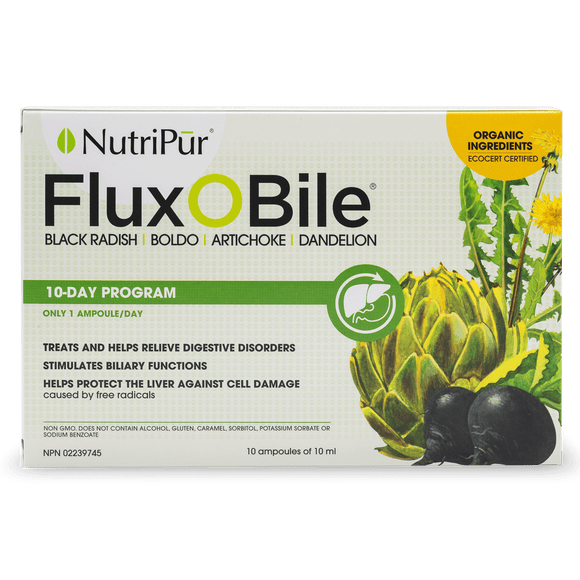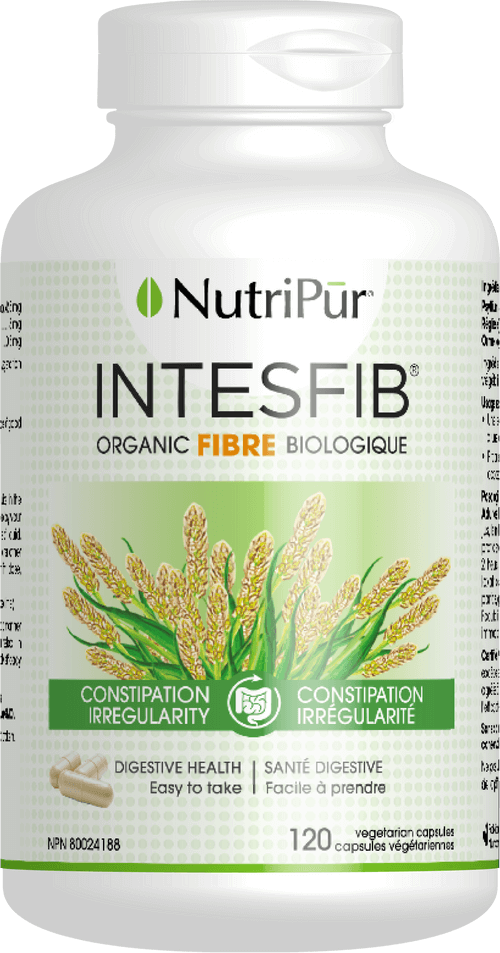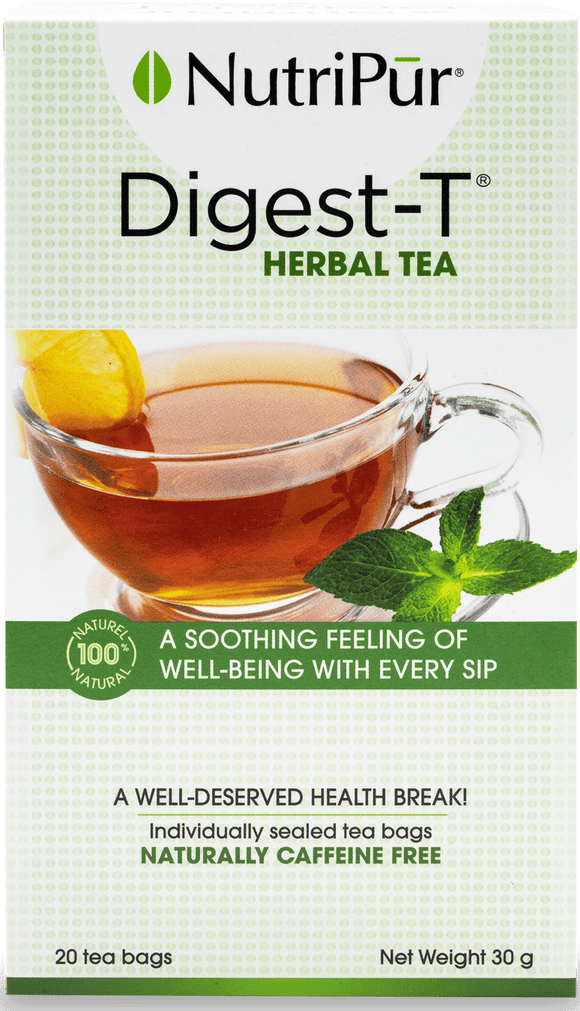Description
Contains three formulas that work gently and naturally to help eliminate toxin build-up from the body. A complete 3 in 1 herbal cleansing 20 day program that helps detoxify the liver, the colon and the kidneys. Can also be used as a seasonal program, at the change of seasons, prior to starting a weight loss program or before planning a pregnancy.
1-Flux-O-Bile (20 ampoules)
A choagogic formula that promotes good digestion. A traditional herbal medicine that stimulates biliary functions One Flux-O-Bile ampoule in the morning will stimulate bile evacuation and ensure proper digestion all day long. 100% Organic certified Ecocert. Contains no colours, flavours, sweeteners, or preservatives, nuts, dairy, eggs, gluten, sulfites, MSG, solvents or contaminants or alcohol. Natural Product Number (NPN) 02239745
2-IntesFib (120 capsules)
Contains psyllium and is recognized as an important source of fibre. Is a blend of psyllium husk U.S.P. grade and of other herbs combined to help facilitate the proper global functions of the intestines. Is made of 93% psyllium husk. Source of fibre to maintain healthy regularity. Natural Product Number (NPN) 80024188
3-Digest-T (40 tea bags)
Is a unique and delightful blend of 14 expressly herbs, chosen for their therapeutic benefits. Is the perfect complement to reinforce, all day long, the beneficial digestive effects of Flux-O-Bile.
Contains organic ingredients. Gluten Free. Suitable for vegetarians.
Ingredients
FLUX O BILE
Medicinal ingredients: Each 10 ml ampoule contains:
Black radish root (Raphanus sativus in water)(water extract 1:10 equivalent to 5000 mg) ........ 500 mg
Boldo leaves (Peumus boldus in water)
(water extract 1:10 equivqlent to 2100 mg) ........ 210 mg
Artichoke leaf (Cynara scolymus in water)
(water extract 1:10 equivalent to 2000 mg) ....... 200 mg
Dandelion root (Taraxacum officinale)
(water extract:1:10 equivalent to 900 mg) .......... 90 mg
INTESFIB CAPSULES
Medicinal ingredients: Each capsule contains:
- Psyllium (seed) (Plantago ovata) 465.0 mg
- Licorice (root) (Glycyrrhiza glabra) 5.0 mg
- Red Elm (bark) (Ulmus fulva) 0.5 mg
Non-Medicinal: Hibiscus, gelatin
DIGEST-T:
Each bag contains:
- Licorice (Glycyrrhiza glabra) (root)
- Star anise (Anis stellati fructus) (fruit)
- Boldo (Peumus boldus) (leaf))
- Marshmallow (Althaea officinalis) (leaf)
- Dandelion (Taraxacum officinale) (root)
- Rhubarb (Rheum palmatum) (root)
- Bearberry (Arctostaphylos uva-ursi) (leaf)
- Cough grass (Agropyrun repens) (root)
- Barberry (Berberis vulgaris) (bark)
- Juniper (Juniperus communis) (berry)
- Spearmint (Mentha spicata) (leaf)
- Red clover (Trifolium pratense) (flower)
- Balm (Melissae officinalis) (leaf)
- Fennel (Foeniculum vulgare) (seed)
Black Radish Root: Black radish root contains glucosinolates. These active components improve gastric disorders, especially those related to biliary functions.
Boldo Leaf: Boldo stimulates the secretion and elimination of bile, allowing for better digestion. It’s also recognized to calm gastrointestinal spasms. Boldo has a long history of use as a liver tonic by the indigenous people of Chile.
Artichoke leaf :With its content in cynarin and bitter principles, the artichoke is a precious aid to help eliminate digestive and hepatic disorders. Used as an aid in lowering cholesterol.
Dandelion root : With its inulin content and bitter substances, dandelion is a very effective liver detoxifying and strengthening herb. Well recognized for its diuretic effect. Dandelion also helps relieve digestive discomforts and dermatological conditions.
Psyllium: Its exceptional richness in mucilaginous psyllium fibre confers it properties that relieve constipation by reducing the total duration of the intestinal transit. Furthermore, psyllium (plantago ovata) is now recognized to help reduce slightly elevated cholesterol blood levels as well as relieve diverticulosis and irritable bowel syndrome.
Licorice: Recognized as an anti-inflammatory, Licorice effectively relieves the irritated mucous membranes of the gastrointestinal tract. Its antibacterial properties confers it the capacity to fight against certain intestinal pathogens.
Red Elm: The mucilage content of Red Elm protects and relieves irritated intestinal mucous membranes. It also aids in preventing diarrhea. Furthermore, Red Elm is recognized to calm multiple inflammations of the digestive tract, in particular the ones affecting the intestines (ex.: colitis).
Hibiscus: Abundantly cultivated in tropical regions and in Europe, the Hibiscus flower is recognized for its virtues as a mild laxative for the intestines.
Star anise: Calm spasms of the digestive system.
Marshmallow : Soothes multiple inflammations of the gastrointestinal tract.
Rhubarb : Increases intestinal motility and restores regularity.
Bearberry : Combats infections of the lower urinary tract.
Cough-grass : Diuretic, reduces urinary tract inflammation.
Barberry : Relieves discomforts caused by indigestion.
Juniper : Corrects and reduces flatulence and bloating.
Spearmint : Reduces flatulence and spasms of the digestive system.
Red clover : Alleviates cramps and spasms.
Balm : Relieves digestive disorders of nervous origin and digestive migraines.
Fennel : Reduces cramp-like gastrointestinal disorders, bloating and flatulence.
Benefits
Flux O Bile: Cleanses the liver, eliminates accumulated toxins, promotes better digestion and stimulates biliary function.
IntesFib: Gently maintains regularity, cleanses the colon, helps reduce cholesterol levels and promotes a better absorption of vitamins and minerals.
Digest-T: Improves sluggish digestion and stimulates intestinal and renal elimination.
Indications
- Seasonal cleansing program
- Fatigue
- Intestinal irregularity
- Candida albicans
- Bloating
- Flatulence
- Poor digestion
- Sluggish liver
- Elevated cholesterol levels
- Difficulty digesting dietary fat
- Constipation
- Digestive migraine
- Nausea after meals
- Overeating, painful joints
- Signs of intoxication (fatigue, runny nose, skin problems,...).
Contraindications
Caution:
Do not use if you are pregnant or breastfeeding. Consult a health care practitioner prior to use if you have liver or gallbladder disease, and/or intestinal obstruction. Verify further contraindications in the packaging.
Recommended dose
FLUX-O-BILE: Adults: Take one ampoule in the morning before breakfast in half a glass (125-ml) of lukewarm water or juice and preferably a minimum of 30 minutes before breakfast. Continue for a minimum of 20 days.
INTESFIB Adults: Take 3 capsules twice a day, with water or juice, in the morning before breakfast (minimum of 30 minutes after Flux O-Bile) and at bedtime or as directed by a health care practitioner. Follow with an additional glass of liquid. Take 2 hours before or after taking other medications. Laxative effect observed 12-24 hours after first dose, and may take 2-3 days.
DIGEST-T: Adults: Let 1 tea bag steep for 3 to 5 minutes in a cup of boiling water. Drink 2 to 4 cups per day, preferably after meals and in the evening.
Continue for a minimum of 20 days.
Brand Information
Nutripur is a 100% Canadian owned and operated company. It specializes in the manufacturing of traditional herbal medicines and nutritional supplements. Founded in 1989, Nutripur focuses its efforts on the development of various products which address specific health problems.
Certified PURE. Contains no artificial colours, flavours, sweeteners or preservatives.
All Nutripur products are manufactured in a manner that exceeds industry standards and are rigorously tested in accredited laboratories for toxic contaminants and heavy metals assuring the safety, purity, efficacy and high-quality of our products. Proud to be Canadian.
Product title
Vendor
$19.99 | $24.99
Product title
Vendor
$19.99 | $24.99
Product title
Vendor
$19.99 | $24.99
Product title
Vendor



